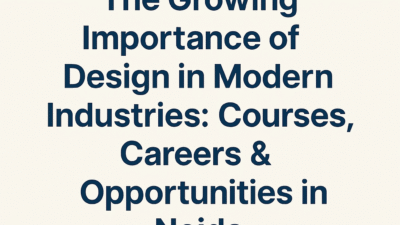Explore how house design intersects with business, trends, and education through top management colleges in Noida and beyond. Design is no longer confined to aesthetics; it’s increasingly becoming a strategic tool used across industries like real estate, management, marketing, and even education.
In today’s fast-evolving world, the boundaries between creative disciplines and business operations are blurring. The role of design, particularly house design, has expanded beyond homes and interiors—it now influences how spaces function in offices, retail, hospitality, and educational institutions. And where does one learn to navigate this new world of integrated thinking? Often, it begins with the right foundation at innovation-focused management colleges in Noida, where business and creativity collide.
🔍 Why Design Matters in Management Today
In modern business environments, decisions are no longer based solely on data—they’re based on experience, emotion, and usability. That’s why design thinking has made its way into boardrooms. Whether it’s designing customer journeys, creating functional office layouts, or optimizing retail environments, the principles of house design can influence performance, productivity, and perception.
In leading management colleges in Noida, students are increasingly exposed to interdisciplinary learning that connects business logic with creative problem-solving. Programs often include subjects like design strategy, space planning, and innovation workshops where students learn how design can serve business objectives.
🏛️ Management Colleges in Noida: Where Design Meets Leadership
With Noida fast becoming a hub for education and startups, several management colleges in Noida are reshaping their curricula to include design-oriented thinking. These colleges emphasize innovation, entrepreneurship, and strategy—making them ideal platforms for students who want to blend management principles with creative disciplines like architecture, interior planning, and house design.
Key benefits of studying in such institutions include:
- Exposure to real-world design challenges in retail, hospitality, and corporate sectors
- Collaborative projects involving architecture and business students
- Access to workshops and electives that bridge design and management
- Career opportunities in industries that blend both disciplines
🏠 Scope of House Design Beyond Residential Spaces
While the term house design may sound like it’s limited to residential spaces, its principles are now widely applied in:
- Corporate offices: Ergonomic layout planning, biophilic design, and branding through interiors
- Educational institutions: Flexible classrooms, co-learning zones, and collaborative environments
- Retail spaces: Experience-driven designs that guide consumer behavior
- Hospitality industry: Guest experience, ambiance, and comfort planning
- Healthcare: Patient-first environments that focus on wellness and recovery
Each of these areas applies concepts such as lighting, material selection, spatial flow, and human-centric planning—skills often explored in management programs with a design lens.
📈 Opportunities and Career Paths at the Intersection of Design and Management
With companies prioritizing user experience and operational efficiency, professionals with both design sensibility and managerial skill are in high demand. Graduates from business schools that emphasize cross-disciplinary learning can pursue roles such as:
- Design Strategist
- Workspace Consultant
- Retail Experience Manager
- Innovation Lab Coordinator
- Project Manager for Real Estate or Architecture Firms
- Brand Space Designer
Startups, architecture firms, event companies, and co-working ventures are some of the biggest employers in this space. Some students even launch their own ventures, offering design consultancy that blends form with function.
🌍 How Trends Are Shaping the Future of Design in Business
The evolving global focus on sustainability, mental well-being, and smart technology is shaping how house design principles are applied across industries. For instance:
- Sustainable Design: Green materials and energy-efficient planning are now expected in both homes and offices.
- Tech-Driven Interiors: IoT integration, smart lighting, and digital control systems are becoming the norm.
- Remote Work Culture: Design now accounts for home-office hybrids, creating demand for work-friendly domestic layouts.
- Experience Design: In retail and hospitality, ambiance and interactivity play a major role in customer loyalty.
Understanding these trends gives future managers and designers a significant edge—especially when they learn to work collaboratively.
🎓 Education That Prepares You for a Design-Driven World
Students who attend top management colleges in Noida often find themselves immersed in a culture of collaboration. Exposure to design-related subjects alongside business fundamentals helps develop:
- Strategic thinking and creative problem-solving
- Communication and leadership skills across multidisciplinary teams
- An eye for innovation that meets user needs and business goals
Whether you come from a business background or a creative one, the fusion of house design with management opens up dynamic career avenues.
✅ Suggestions for Aspiring Students
- Choose programs that offer design electives or innovation labs.
- Look for industry partnerships or live project exposure in your chosen college.
- Build a portfolio that reflects your interest in both business and design.
- Stay updated on trends in space planning, sustainability, and design software.
- Consider internships in real estate, coworking, hospitality, or interior design firms.
🧠 Final Thoughts
As industries evolve, the line between design and management continues to fade. Whether you dream of running a design studio, optimizing workspaces, or curating immersive retail experiences, learning how house design applies to business is becoming essential.
If you’re looking to study in an environment where creativity meets strategy, the emerging management colleges in Noida offer just the right platform to grow. It’s not just about managing people or projects anymore—it’s about managing ideas, environments, and experiences.



